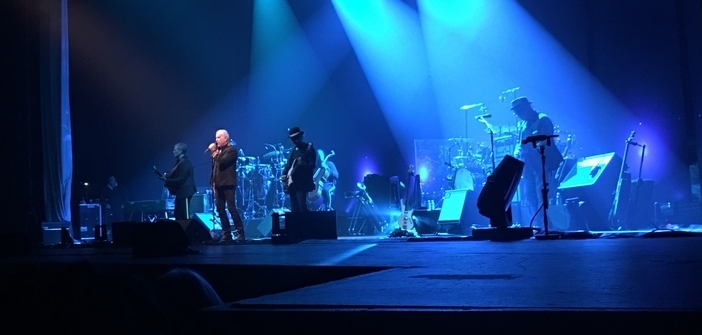The unchanging and unmistakable Lavilliers performed on Friday night in Nice, at the Apollon hall of the Acropolis, where fans of all generations came to welcome the return of the traveling singer to the Côte d’Azur.
With a swaying step that grazes the stage, a solemn gesture that strikes, and an outstretched hand that takes us along. Eternal Lavilliers, powerful, sensual, and so modest at the melancholy mention of the passing, on that very day, of Jacques Higelin, “his cousin,” as he says.
First words are for the departed friend, to whom he dedicates the concert; first discreet notes to let the text speak, Lavilliers evokes the “Mediterranean Cruises,” always with an eye on the world and its human plights that move and outrage him. Behind this impactful voice, an infinite sadness pierces through. And to express it, poetry is never far away. A few days earlier, in the press, to illustrate his thoughts, he quoted Baudelaire “Free man, you will always cherish the sea,” an elegant way to dress his anger at this sea that has today turned into a cemetery.
Resuming the tracks from his latest album, “Five Minutes in Paradise,” accompanied by brass, electric guitars, strings, and percussion for a mineral purity ensemble. The orchestration spices up and elevates these beautiful songs. Sometimes the singer steps aside for the spotlight to focus first on one, then another of his musicians. A moment of grace with Daniel Romeo, the bassist, a little virtuoso who delights us with a solo, towering over Bernard Lavilliers’ interpretation of the poem “La Gloire,” written in 1957 by Pierre Seghers.
In the hall, the spectators, comfortably seated, appreciate but do not let go. The atmosphere doesn’t lend itself to it. They drink in the singer-songwriter’s words but eagerly await the former songs, the ones they know by heart.
Lavilliers, 72, an old hand at his craft. He masters it. He has planned everything. He changes the register with “Stand the Ghetto,” a staple of his repertoire. The immediate effect, bodies start moving, surreptitiously!
Reggae disinhibits and invites to travel; a journey into Lavilliers’ exotic universe, from Brazil to the Caribbean, “from any country, of any color.” The music “that comes from within” unites souls. The traditional music of the singer, Latino and rock, ignites the hearts. The Nice Acropolis is in turmoil.
Everyone in the hall sings and dances. Lavilliers is overjoyed. He is happy, and it shows. He helms the ship of the drunken boat. His presence on stage is imposing but also soothing. He’s not a performer like Johnny used to be. He simply assures, without overplaying. A subtle blend of strength and sensitivity. Lavilliers is who he is and offers himself generously to his audience. It’s magnificent. A grand spectacle. The light shows are in symbiosis, rhythmically driven by the drummers’ outbursts and the guitarists’ riffs. For the climax, the maestro proposes a salsa “a whip from top to bottom that lifts you, that’s salsa…” And everyone joins in the chorus, just like with the song “Les Mains d’Or,” referring to his steelworker father’s hands, now “in the communist paradise,” as he delicately slides it to us.
Bravo, the artist, in turn, an engaged poet and a frenzied rocker. Like the passionate boxer he once was, the composer-performer is far from having fought his last battle.
He proved to us once again during his concert in Nice that the desire to give happiness and share his revolts with his audience still animates him as much. As the song goes, “music is a cry that comes from within.” And Bernard Lavilliers’ voice carries and will continue to carry his messages for a long time to come… far and wide.
Bruno Kauffmann


